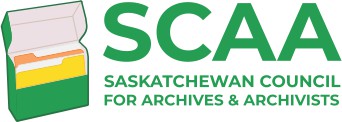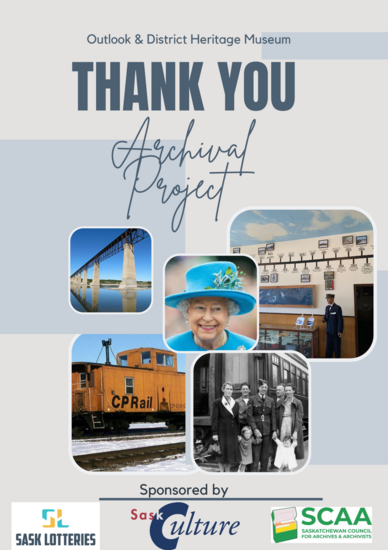Grant and Funding Programs
The Saskatchewan Council for Archives and Archivists (SCAA) wishes, to thank our sponsor, SaskCulture and the Saskatchewan Lotteries Fund. The funding received allows SCAA to provide funding to eligible projects through our Institutional Grant Program (IGP); subsidize travel and professional development opportunities to our members; and provide small amounts to member institutions to help them celebrate Archives Week annually.
On June 12 2015 the Documentary Heritage Community Program (DHCP) was announced from Library and Archives Canada.Our members check their eligibility for funds on the website, the SCAA is able to, and will apply to provide services to our membership as well as advocate for the archival community in Saskatchewan
Please be aware of the Young Canada Works (YCW) program, https://archivescanada.ca/young-canada-works/. There are several areas of funding that your institution may be eligible for.
2025-2026 Institutional Grants Program (IGP)
The SCAA Grants Committee wishes to thank all those members who submitted project proposals for the 2025-2026 Institutional Grants Program (IGP). All applications have been adjudicated by the committee and the applicants have been informed of their status.
In order to receive funds the institutional member must be a “member in good standing” in the year the application is made AND in the year the funds are received.
Please review your institution’s SCAA membership status to assure your eligibility.
Reporting requirements for previous projects must be fulfilled prior to release of funds for new successful applications.
Granted funds must be used for the project awarded and any un-expended funds must be reported to the SCAA office before MARCH 31.
Any changes or modifications to how granted funds are to be used need to be reported to the SCAA. Institutions who change the project scope or budget without prior approval from the SCAA may be required to return some or all of the granted funds to the SCAA.
IGP Final reports
If your institution received a grant for a purchase or project to be completed in the 2024-25 fiscal year, April 1, 2024 - March 31, 2025, or any other previous year, please download the "final report form" and the example of the "letter of thanks" and complete them.
The funds approved for you project are to be spent and/or your purchase by March 31, 2025. Please inform the SCAA office prior to then.
If your project is complete and/or your purchase has been made, you may complete the "final report" and "letter of thanks" at any time. Though they are not finally due until May 31, 2025.
If your project is continuing past October 31, 2024 please complete the short "Interim report" to highlight it's progress.
Be aware that if your institution is hoping to receive an SCAA grant in the future, its dispersal may be delayed until the SCAA office has received notice of the completion of the report and letter. (including Archives Week grant and Professional Development funds at the discretion of the SCAA office)
Diversity Plan
The SCAA’s Diversity Initiative
(Fall 2015; Updated January 2018)
Download and review SCAA's Diversity Plan
In 2014-15, the Saskatchewan Council for Archives and Archivists was chosen as one of five organizations to take part in SaskCulture’s Diversity Pilot Project. SaskCulture states very clearly in their Strategic Plan that its aim is to ensure that “cultural opportunities are inclusive, responsive and reflective of the changing face of the province”, and the groups that it funds must “…re-assess, re-think and re-vamp to ensure they offer the most inclusive programs and services – engaging increasingly diverse members, participants, volunteers and audiences”. It was hinted that future funding could be contingent upon adopting these ideals – that got our attention!
So, to this end, over the past year, members of the SCAA Executive have been meeting with a consultant to, first of all, understand what diversity means to us, and secondly, investigate ways to bring about a more diverse SCAA. We were advised that SaskCulture was primarily focusing on two groups; First Nations/Metis, as well as new Canadians, but, as we all know, there are many other groups and communities in the province that would be appropriate in any discussion about diversity.
For more information on the SaskCulture, Strategic Plan, 2015-2019, go to www.saskculture.ca/content/generic_atoms/titlefilecaption-files/SaskCulture2015_SP_web.pdf.
In recent years, the Grants component of the SCAA has been very well subscribed, and members have come to rely on these funds for many projects. This was one area where the Executive felt that the Council could possibly “nudge” our members into coming up with projects that would fall under this diversity umbrella. We (the executive) discussed how the term diversity applies to archives and our members; we believe that it could apply to both users/researchers, as well as holdings. Proposals that focused on bringing about greater inclusion in the community, or projects related to individuals or groups that are relevant to those of a diverse culture would be regarded favourably by the Grants Committee.
The idea of diversity and inclusivity is a product of our changing society in Saskatchewan. The SCAA, in an effort to be relevant and accessible to all the people in the province, is hoping to incorporate these ideals into our day-to-day operations. Look for future diversity initiatives including training opportunities and workshops to be announced over the coming year. One of our main goals is to bring the history of the province to as many people as possible. The diversity ideal may be one of our most effective tools to do this.





